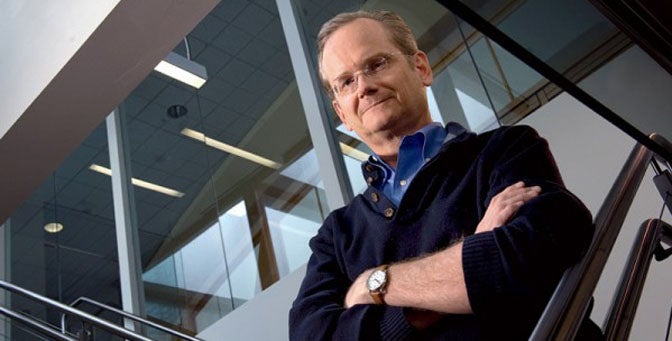Lawrence Lessig, the Roy L. Furman Professor of Law and Leadership at HLS and director of Harvard’s Edmond J. Safra Center for Ethics, is the author of “Republic, Lost: How Money Corrupts Congress—and a Plan to Stop It,” an exhaustively researched and passionately argued indictment of Capitol Hill and the money-centered daily dance between lawmakers and lobbyists.
As a columnist for Atlantic Magazine and in interviews on national media, he has shared his ideas on how to stop corruption in Congress.
He was recently profiled in a Harvard Magazine piece by Jonathan Shaw entitled “A Radical Fix for the Republic.”
A Radical Fix for the Republic
by Jonathan Shaw/Harvard Magazine
For a decade, Lawrence Lessig, a mild-seeming legal scholar, pursued the intricacies of updating American copyright law to reflect the rise of the digital era, the Internet, and new means of producing and disseminating texts, music, images, and software. Based first at Harvard, then Stanford, he co-founded organizations such as Creative Commons, a nonprofit that gives people legal tools to control use of their creative output, and argued that mashups (of songs or YouTube videos, for example) are culturally important products that (in some circumstances) can be legal under the principle of fair use.
He felt he was making progress: “The public was getting it. Businesses were getting it. Universities. Everybody had come to the recognition that ‘There is something wrong with the existing system,’ and that it needed to be updated—but we were making no progress in the context of policymakers.” At first, he was puzzled. But gradually he realized the problem lay in the sclerotic, gridlocked policymaking system itself—particularly in Congress. “We weren’t making any progress because money was so inherent and tied to decisions,” he says now. “The public domain had no lobbyists. The ideas of the public domain weren’t even on the table because there was no infrastructure for putting them there.”
As long as Congress remains in the thrall of “the economy of influence”—its members dependent on money to fund reelection campaigns—“no progress would be made on copyright or any other public-policy question,” he explains. “It wasn’t just esoteric areas like copyright, it was also fundamental issues like global warming, healthcare, or any number of others.”
That set Lessig off in a new direction—including an exploratory, aborted run for Congress and, ultimately, in 2008, a return to Harvard. He now directs the Safra Center for Ethics, serves as Furman professor of law and leadership at Harvard Law School, and investigates the American government and what ails it. His findings, recently published in Republic, Lost: How Money Corrupts Congress—and a Plan to Stop It, have led him to conclude that nothing less than overhauling the way elections are funded—involving a tool never before invoked in American democracy—is required. … Read the full article at HarvardMagazine.com »
At HLS, Jack Abramoff talks about corruption in Washington
Appearing at Harvard Law School a year and a half after being released from federal prison, a contrite Jack Abramoff expressed a desire to thwart the political corruption he once infamously practiced. The event on Dec. 6, 2011, was sponsored by the Edmond J. Safra Center for Ethics, whose director, HLS Professor Lawrence Lessig, interviewed Abramoff, a former lobbyist who pleaded guilty in 2006 to charges of fraud, tax evasion, and conspiracy to bribe public officials. “His experience,” said Lessig, “has an enormous amount to teach us.” (read the full story)
Lessig on ‘The Daily Show’
Harvard Law School Professor Lawrence Lessig was a guest on “The Daily Show with Jon Stewart” on Dec. 13, 2011. In a two-part interview, he addressed the corrupting influence of special interest money in Congress and a proposal for a voucher system to fund Congressional campaigns. (read the full story)
Lessig and Gergen on ‘Republic, Lost’
A conversation with Lessig and Harvard Kennedy School Professor David Gergen on Lessig’s book, “Republic, Lost: How Money Corrupts Congress—and a Plan to Stop It.” (read the full story)
